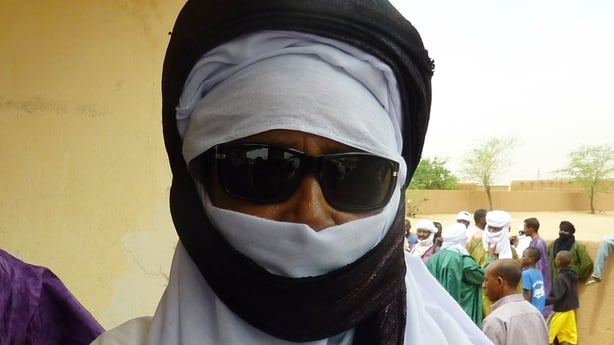Niger's new military rulers on Wednesday accused France, the country's traditional ally, of releasing captured jihadists and breaching a ban on air space on the eve of a key summit on the Sahel's latest crisis.
Leaders of the West African bloc ECOWAS are to meet in the Nigerian capital Abuja to weigh their options, with diplomacy apparently edging out military intervention at present after a showdown last weekend.
Two weeks after a coup that toppled Niger's elected president, the regime accused France of having "unilaterally freed captured terrorists" - a term for jihadists conducting a bloody eight-year-old insurgency.
The jihadists then allegedly gathered to plan an attack on "military positions in the tri-border area," a hotspot region where the frontiers of Niger, Burkina Faso and Mali converge, according to the statement issued by the coup leaders, called the National Council for the Safeguard of the Homeland (CNSP).
"Events of an extreme gravity are unfolding in Niger as a result of the behaviour of the French forces and their accomplices," it declared.
It urged the security forces to "raise their alert level across the country" and on the public "to remain mobilised and vigilant".
The regime also accused France of having flown a "military plane" from neighbouring Chad into Niger air space on Wednesday, defying a ban imposed on Sunday.
The allegations were rejected by the French government.
"France firmly denies the new unfounded accusations by the putschists in Niger," said a joint statement by the French defence and foreign ministries.
Key summit
They also rejected the claim that France, which has around 1,500 soldiers stationed in Niger to aid anti-insurgency efforts, had released any jihadist prisoners.
It added that the flight had been approved and coordinated with Nigerian armed forces, "an authorisation confirmed in writing".
Thursday's summit of the Economic Community of West African States (ECOWAS) takes place under the chairmanship of Nigeria, the regional superpower and advocate of a hard line against the coup.
Struggling to stem a cascade of putsches among its members, the bloc gave Niger's military rulers until last Sunday to reinstate President Mohamed Bazoum or face potential use of force.
But the coup leaders remained defiant, and the ultimatum passed without action.
On Tuesday, a bid to send a joint team of ECOWAS, UN and African Union (AU) representatives to the capital Niamey was rejected by the coup leaders.
Despite the failure, ECOWAS and Nigeria said they would pursue all options to resolve the crisis, and the United States emphasised a "peaceful" outcome even though it too had been rebuffed.
Nigerian President Bola Tinubu said through his spokesman that "no options have been taken off of the table" but diplomacy was the "best way forward".
In a twist in negotiations on Wednesday, a former Nigerian emir revealed that he had met with the coup leaders to help mediate the crisis.
"We have spoken to the head of state," the new strongman General Abdourahamane Tiani, and will deliver a "message" to Tinubu, said Sanusi Lamido Sanusi on Nigerian state television, adding he was not an emissary of the government.
"We came hoping that our arrival will pave the way for real discussions between the leaders of Niger and those of Nigeria," said Sanusi, who is known to be a close friend of Tinubu.

A former rebel leader and politician in Niger has launched a movement opposing the junta that took power in a 26 July coup, a first sign of internal resistance to army rule in the strategically important Sahel country.
Rhissa Ag Boula said in a statement seen this morning that his new Council of Resistance for the Republic (CRR) aimed to reinstate ousted President Mohamed Bazoum, who has been in detention at his residence since the takeover.
"Niger is the victim of a tragedy orchestrated by people charged with protecting it," the statement said.
Mr Ag Boula played a leading role in uprisings by Tuaregs, a nomadic ethnic group present in Niger's desert north, in the 1990s and 2000s. Like many former rebels, he was integrated into government under Mr Bazoum and his predecessor Mahamadou Issoufou.
While the extent of support for the CRR is unclear, Mr Ag Boula's statement will worry the coup leaders given his influence among Tuaregs, who control commerce and politics in much of the vast north. Support from Tuaregs would be key to securing the junta's control beyond Niamey's city limits.
'Peaceful resolution'
US Secretary of State Antony Blinken said Wednesday that he had spoken to Bazoum "to express our continued efforts to find a peaceful resolution" to the "current constitutional crisis".
France, which had adopted a combative tone as the ECOWAS ultimatum loomed, also signalled a softer line.
A French diplomat said it was "up to ECOWAS to take a decision, of whatever kind, on restoring constitutional order in Niger".
Bazoum, 63, was detained on 26 July by members of his presidential guard.
It is the fifth coup in Niger's history since independence from France in 1960 - and the fourth in the ranks of the 15-nation ECOWAS since 2020.
Bazoum's election in 2021 had helped Niger to cement close ties with France and the United States, which have major bases and troop deployments in the country.
Sahel crisis
Countries in the fragile Sahel are battling with a jihadist insurgency that erupted in northern Mali in 2012, spread to Niger and Burkina Faso in 2015 and now is causing jitters in states on the Gulf of Guinea.
The bloody campaign has been devastating for those three countries, which have a long history of turbulence and are among the poorest nations in the world.
Mali and Burkina Faso have also seen coups in recent years and fallen out with France, the region's former colonial power and its traditional ally.
France last year withdrew its forces from those countries and refocused its anti-jihadist strategy on Niger.
